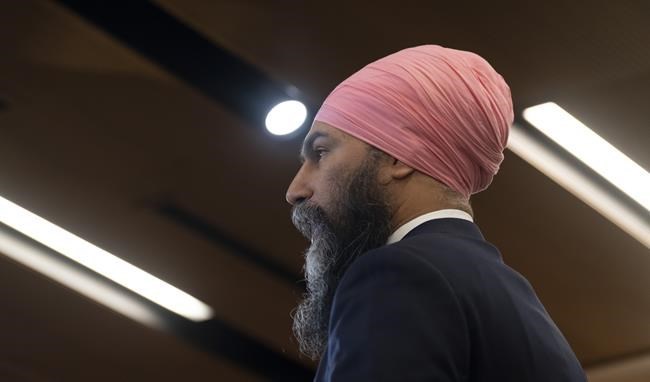OTTAWA — Jagmeet Singh took a victory lap at his New Democrat caucus meeting on Wednesday in a speech that praised his party’s wins in the recent federal budget.
But noticeably absent from the NDP leader's speech, and from the 2023-24 spending plan, was any mention of one of his party's biggest priorities: pharmacare.
The confidence-and-supply agreement requires the government to table legislation on a pharmacare framework by the end of the calendar year in exchange for the NDP's support on key votes in the House of Commons.
Both parties say that is still on track to happen, though even if a bill is introduced by December, it is unclear when a program could be operational — and when Canadians could begin to save money when filling out their prescriptions.
Asked Wednesday about why the budget contained several other NDP priorities but not pharmacare, Singh said: "What we were able to force the government to do is what we could negotiate."
The NDP still claimed a win after the government announced Tuesday that it would pump billions of dollars into a new dental-care program and committed to introducing anti-scab legislation by the end of the year.
But while political experts and Conservatives are calling it an NDP-inspired budget, New Democrats say if that was truly the case, money for pharmacare would've been part of it.
"The Liberals don't seem to be as committed," Singh said Wednesday, adding that when the deal was originally struck, the NDP had difficulty pushing the Liberals to commit to anything beyond introducing a legislative framework.
Pharmacare remains one of the only wedge issues that continues to divide the two parties, said David Tabachnick, a professor of political science at Nipissing University.
"The NDP and the Liberals have become one in everything but name. I don't know what colour red and orange make, but that's kind of where we're getting at."
The Liberals, in their 2019 election platform, campaigned on a promise to implement national universal pharmacare. Similar commitments have appeared in throne speeches and mandate letters to the federal health minister.
An expert panel appointed by the Liberals recommended in 2019 that a universal, single-payer public pharmacare system should be created in Canada to replace the current patchwork of prescription drug plans.
The panel, which was led by former Ontario health minister Eric Hoskins, reported that such a plan would save Canadians an estimated $5 billion every year.
"It's really fallen off the table, in part because of the pandemic, and because they increased spending so much," said Lydia Miljan, a political science professor at the University of Windsor.
She noted that the government is anticipating a $40-billion deficit for the coming fiscal year.
"They don't have the money, and ... they'd have to negotiate with the provinces, much like child care. These are not one-off funding requests. It's structural and would commit future governments to it, which is a difficult sell to the provinces."
Prime Minister Justin Trudeau has continued to skirt around the topic, saying on Wednesday that his government will work to bring down drug prices for Canadians while liaising with other jurisdictions.
Experts say that a year into the Liberal-NDP deal, which was originally slated to extend to 2025, it looks like pharmacare has become the carrot that Liberals dangle in front of New Democrats to keep their support.
They question whether Liberals will actually pass legislation, even if they introduce it.
"I think everyone sees the writing on the wall with this one," said Miljan.
At the end of the day, the Liberal government isn't going to give the NDP everything it wants, said David McGrane, political studies professor at the University of Saskatchewan — because, he said, the government doesn't want to give the impression that it's being controlled.
"The Liberals have been going very slowly with pharmacare," McGrane said. "They're doing as little as possible, but enough to fulfill the deal."
Plus, he pointed out, the Liberals may want to keep the prospective policy in their back pocket to use in future election campaigns.
While pharmacare might not be the "centrepiece" of the next Liberal campaign, he said, "Why not run another election and say, 'We'll make progress on pharmacare'?
"If you get the pharmacare deal done, you can't run on it in the next election."
This report by The Canadian Press was first published March 29, 2023.
Mickey Djuric, The Canadian Press



